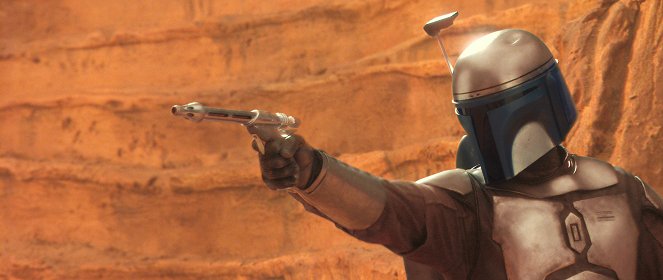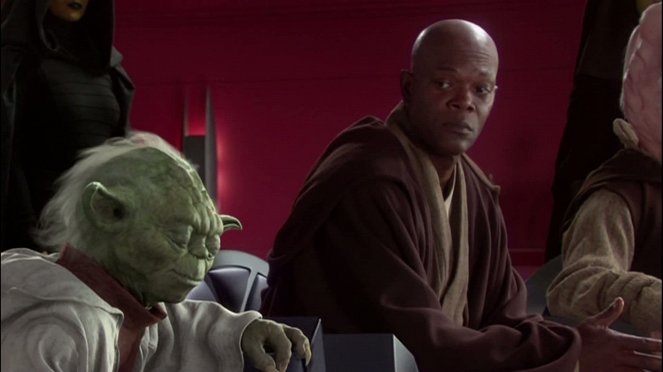Directed by:
George LucasCinematography:
David TattersallComposer:
John WilliamsCast:
Ewan McGregor, Natalie Portman, Hayden Christensen, Christopher Lee, Samuel L. Jackson, Frank Oz, Ian McDiarmid, Pernilla August, Temuera Morrison (more)VOD (4)
Plots(1)
Ten years after initially meeting, Anakin Skywalker shares a forbidden romance with Padmé, while Obi-Wan investigates an assassination attempt on the Senator and discovers a secret clone army crafted for the Jedi. (20th Century Fox UK)
Videos (1)
Reviews (12)
Whereas Star Wars: Episode I “only” lacked the heart of the original trilogy, Episode II is just a dramaturgically lame comic-book popcorn flick. At the same time, however, it’s jam-packed with so many great characters, bombastic action, romance and plot twists that are important to the development of the Star Wars saga that it’s impossible to be bored for even a second. The visual effects are shoddy in some places, but the best of them are stunningly good. This is not the good old heartwarming Star Wars of before, but in the context of contemporary eye-candy popcorn entertainment, it’s great.
()
The love scene with the couple by the waterfalls looks like a Nivea commercial. During the battle in the arena, the Jedi look so bored with their lightsabers that I keep waiting for them to roll a joint. The final battle is a massive mess. Add to that directorial shortcomings such as the final chase, in which Padmé falls out of a flying machine, drops from a great height to the ground and, as if in a last ditch effort, shakes her legs like a beetle, gets back on her feet like nothing happened and starts giving orders. There is no point in going on about other lapses, there are plenty of them. Lucas wanted to pay homage to everyone: Beverly Hills 90210, Gladiator, Chaplin's Modern Times, Blade Runner – it's all here. Unfortunately. But this is still Star Wars, and as the episodes roll in, this new coat of the magic that I love so much from the original trilogy takes on a new look.
()
One film legend says that there was a fundamental difference in the approach to the world of cinema among the three most influential filmmakers of the 70s, namely Spielberg, Coppola, and Lucas. While Spielberg and Coppola literally lived for movies, exhaustively watched the performances of acclaimed film classics in film clubs, passionately discussed cinema with similarly affected individuals late into the night, and tried to push the world of film forward, Lucas was an enthusiastic reader of outdated comics, a viewer of 1950s TV space operas, and film theory was inherently foreign to him. However, he was able to capture the essence of popular culture and the transformation of the film audience from the 40s to the 70s, when the average age of cinema-goers continued to decrease. At the same time, due to sociological processes and the enrichment of society, there was a change in the perception of film. The infantilization fully manifested itself and the concept of a family film with a lower standard prevailed to be understood by a wider range of potential viewers. This is how Star Wars came into being, where a fairytale was wrapped in cosmic technology and the nonsense of the then-popular New Age movement. Lucas filmed it as visually and naively as possible, and precisely because of that, it had such a penetrating success. What succeeds attracts attention and the desire to imitate, and at a certain stage, when it becomes a cult, it is practically unquestionable and by itself carries the seal of quality regardless of its content. I saw the first three films of the famous series at an age when I found the motifs and execution, especially the "intellectual superstructure," laughable. Otherwise, the course of events is such that you see it for the first time at the age of 8-9, and then with an iron regularity, so you grow up with it and it has emotional and nostalgic value for you. Even if I grew up with it, I still would have most likely become a fan of the Star Trek series, which, despite its clichés, naivety, and the ideological basis that stems from multiculturalism, represents an honest work from the sci-fi genre. Star Wars only shares the space settings with the sci-fi genre. It is a fairytale fantasy that is neither clever nor innovative nor brilliantly directed. The later three episodes of the series are loaded with bombastic special effects, but they are more childish than anything, and they also lack the confident ironic detachment that emanates from every smirk of Han Solo. His portrayal by Harrison Ford somewhat resembles the much more pronounced ironic detachment of the Indiana Jones character. Personally, the entire series has nothing to offer me, and although there are understandably significant nuances between each film, what bothers me, such as the frenzied waving of lightsabers, the babbling about the Force, and the cute plush creatures as extraterrestrials, are typical of all the episodes. Therefore, this commentary applies to all parts of the Star Wars series. Overall impression: 20% for the set design.
()
(less)
(more)
Following the childishly naive Episode I, along comes the adolescently boorish, emo and theatrically unbalanced and ridiculously “dark and gritty” second episode. If Episode I betrayed the original trilogy by denigrating and distorting the canon, with midi-chlorians at the fore, but at least stood up as an autonomous narrative and a boisterous children’s movie, then Episode II conversely renounces not only self-containment but also internal logic in the interest of meticulously paving the way for the original trilogy. All of the characters become inanimate puppets, circling around a vain, egocentric brat. This is most frighteningly apparent in Anakin and Amidala’s relationship, which takes on not only a distinctly perverse but also repulsive form. As if by a wave of a Jedi hand, the princess loses any will of her own; her resolve and active nature seen in the first episode are replaced by unconditional submissiveness and lobotomization. At the same time, however, the slapdash screenplay gives the vain, blandly brooding asocial prick, who loudly declares his own supposed exceptionalism, every possible trophy, including the princess, and then presents an unprecedentedly repulsive projection screen for equally vain and supposedly chosen nerds.
()
If you were expecting some significant darkening after the infantilism and overwroughtness of Episode I, well... You can wait on. That said, it's definitely better than Episode I, but the question is whether better is enough when it's still an overstuffed popcorn nonentity with the most annoying CGI character in history.
()
Gallery (125)
Photo © 2002 20th Century Fox



Ads